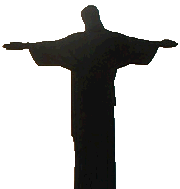07/15/2004: "Question of the Day: How do Catholics relate between scriptural Scriptural Church offices (prophet, teachers, apostles etc.) and modern Catholic Church offices (bishop, priest, and deacon)?"
This question was submitted by John Henry, the first to jump at the opportunity to ask a question. You can see his exact question (I had to reformat for room) in yesterday's Question of the Day comment box.
This is a good question that I think more people would be wise to ask of their leaders in their church. What exactly is their role? What is its basis?
All of the terms, Bishop, Priest and Deacon are scriptural terms. The First Letter of Saint Paul to Timothy, Chapter 3 speaks of the role of the Bishop (some translations use the term Overseer, but most use the term Bishop) and the Deacon. It is a good section of the Bible to read about Paul's vision for the Church as he was commisioning Timothy to lead the faithful in Ephesus.
Bishops were and are the leader of their communities, chosen initially by the Apostles and then by the preceeding Bishop. Timothy was the Bishop of Ephesus, chosen by Paul, an Apostle, for this role. When Timothy left that community, either for another community or into the afterlife, he would have chosen a successor. In the Catholic Church, we use this passing on of the faith from one Bishop to the next, starting with the Apostles, as being the basis for our belief in Apostolic Succession. We see the term of Bishop as being an extension of the term Apostle. The only people in the Catholic Church who can teach "officially" are the Bishops. Priests and Deacons are their assistants and must submit to the teaching authority of the Bishop.
The although the role of the Deacon in First Timothy is vague, other early Church writings see them as assistants to the Bishops. Today they most frequently act as assistants to Priests, who are themselves assistants to Bishops.
Which brings us finally to Priests. Priests are mentioned throughout the old and new testament. Priests are ordained to make sacrifices to the Lord. In the Catholic Church, we see the Mass and the Eucharist as a scraficial offering to the Lord and so the assistants to the Bishop who can officiate at that sacrifice are called Priests. Deacons can not officiate at a Mass (they can assist).
The other role you mentioned was that of Prophet. A Prophet is someone who hears the word of God to share with the world. We as Christians believe that Christ was the final public revelation of God and therefore, there are no Prophets in the Catholic Church.
It is important to note, that these roles are not the only ways that a Catholic can be servant of the Lord (something many Catholics forget as well). We can all serve God in one way or another. But the teaching role of Apostle (Bishop), the sacrificial role of the Priest and assistant to the Bishop (Deacon) have been specifically called out in scripture as ordained ways in with those who are called to that ministry can serve Him.

